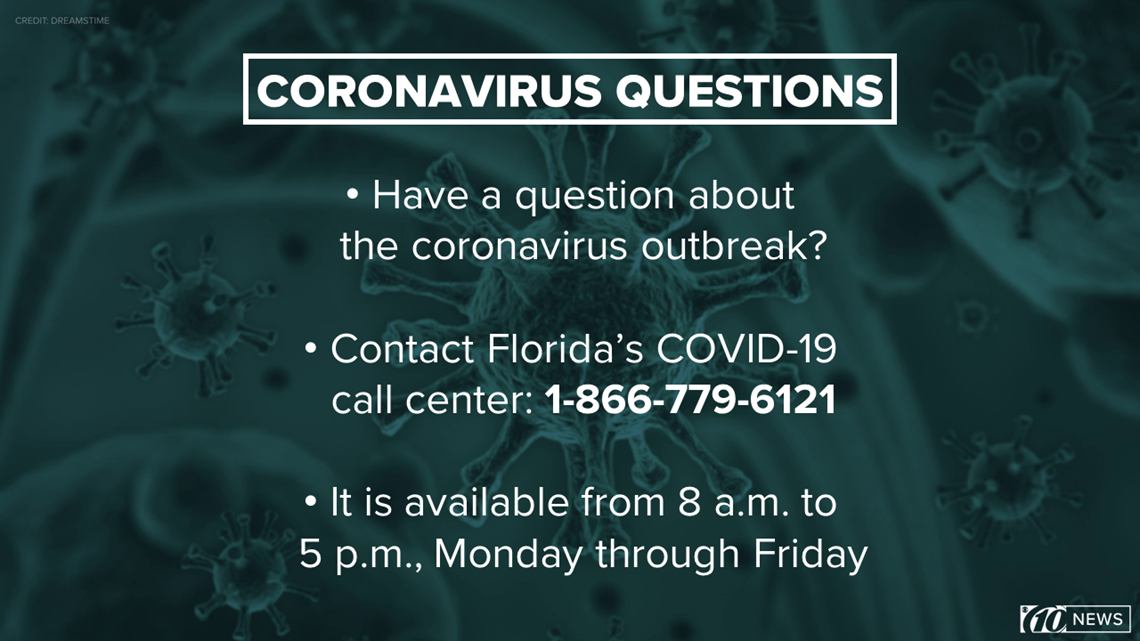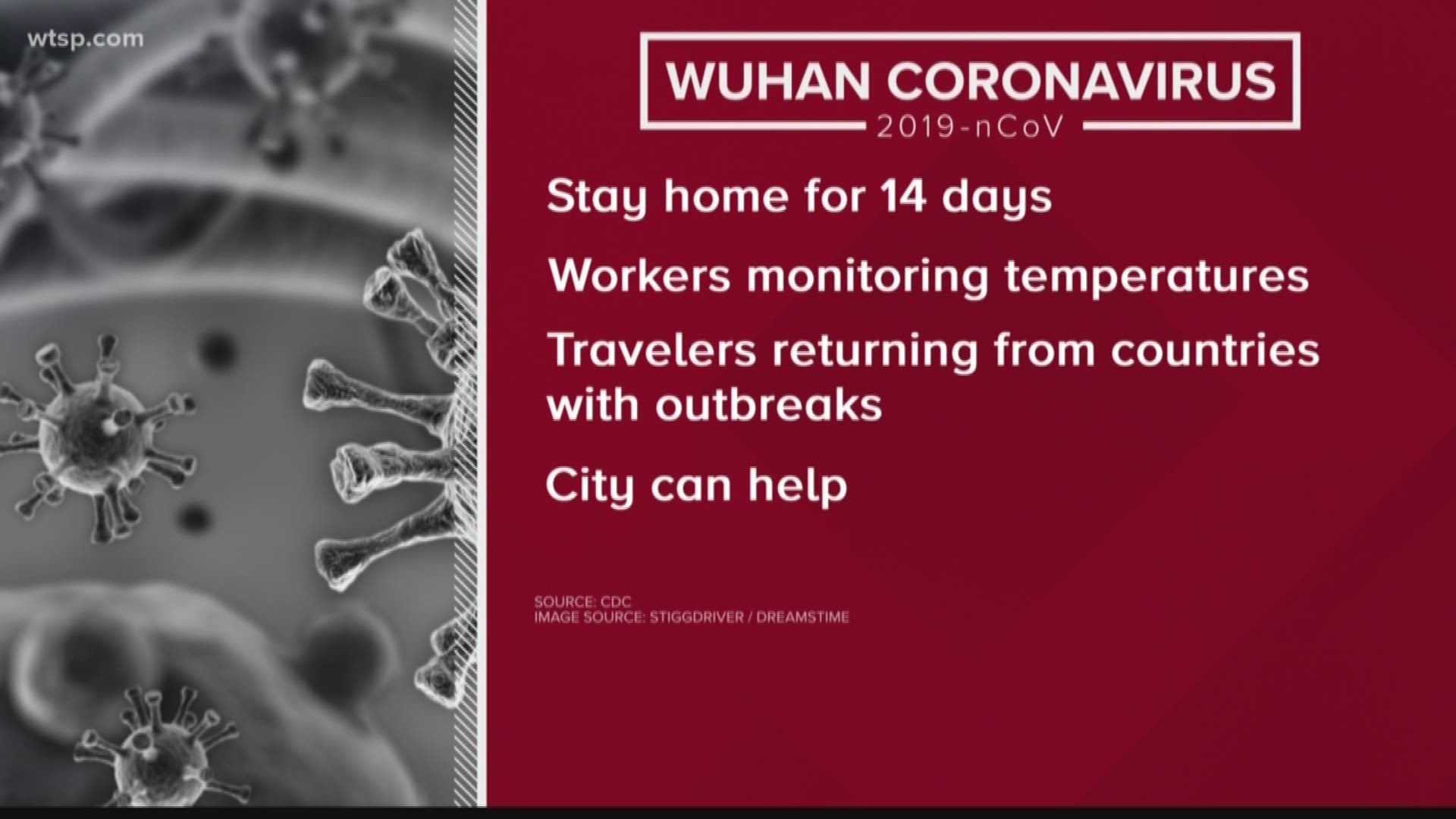TAMPA, Fla. — Update: A third person in Florida has tested 'presumptive positive' for COVID-19. The state is awaiting final confirmation from the Centers for Disease Control.
Gov. Ron DeSantis announced Monday two people in Tampa Bay tested positive for the coronavirus, and he expected the number of cases to rise.
According to the Florida Department of Health, there are now 247 people in the state being monitored for symptoms.
This is a developing story. Stay with 10news for updates at WTSP.com/coronavirus.
Original story:
The new coronavirus, which was first detected in China, has reached Florida.
Gov. Ron DeSantis announced two cases of the novel virus had been confirmed in the Tampa Bay area. He, too, issued an executive order to declare a public health emergency in Florida and establish protocols for controlling its spread.
Two people in Florida tested "presumptively positive" for COVID-19 during the weekend, including someone from Manatee County and someone from Hillsborough County. It was confirmed Monday by the Centers for Disease Control and Prevention that the two people both, in fact, have coronavirus.
They are isolated and getting medical attention.
During a Monday morning news conference, DeSantis said the state is now monitoring 184 potential coronavirus cases and there will likely be more positive cases. Still, state Surgeon General Scott Rivkees said the threat to the general public is "still low."
UPDATE: Florida monitoring 184 potential cases of COVID-19; 'public risk is still low,' governor says


The Florida Department of Health said the patient from Manatee County hasn't traveled to countries identified for restricted travel by the CDC. That person, described only as an adult, went and got medical care and is now isolated until public health officials give the all-clear. Medical professionals are working closely to monitor anyone who may have come into contact with the person.
The second person -- a woman in her 20s -- is from Hillsborough County and had traveled to Italy, according to the Florida Department of Health. She is isolated and will continue to remain isolated until cleared by health experts.
While the governor's office did not specify where the patients were being treated, a letter appearing to be from Doctors Hospital of Sarasota suggests a patient is there.
The March 1 notice, which is printed on letterhead from Doctors Hospital, said the patient was admitted in late February and is still present. When the medical staff realized the patient might have coronavirus, the hospital reportedly activated COVID-19 protocols and identified everyone who had come in contact with the individual.
The letter said the hospital was working with local and state health officials, along with the CDC, to make sure it was taking all possible precautions.
"There is no information we can provide at this time," the hospital said in a statement, which directed people to county health leaders.
"State Surgeon General Dr. Scott Rivkees has taken appropriate, decisive action to help affect the best possible outcomes, and I will continue directing our state agencies to do whatever is necessary to prioritize the health and well-being of Florida residents," DeSantis said.
The governor has instructed the Florida Department of Health to make its own determinations with regard to any quarantines and other possible public health interventions, as allowed under state law.
"Despite these cases in Florida, the overall immediate threat to the public remains low," a state health department spokesperson wrote in an email.
People who are looking for more information on how to prevent the spread of the coronavirus and about how to protect themselves can visit the Florida Department of health’s website. Additional useful information can be found on the CDC’s website and the World of Health Organization’s website.
On the other side of the country, six people have now died from COVID-19 in Washington state.
Symptoms of COVID-19 include fever, coughing and shortness of breath. They may appear in as few as two days or as many as 14 days. Most people recover, although older people and individuals with underlying medical conditions like high blood pressure and diabetes are at a greater risk of developing a more serious illness.
There isn't yet a vaccine for preventing COVID-19, so the best way to stay healthy is to limit your risk of being exposed to it.
To stay safe from the coronavirus, health experts say you should wash your hands frequently with soap and water for at least 20 seconds, especially after going to the bathroom, before eating, and after blowing your nose, coughing or sneezing. If soap and water are not available, use an alcohol-based hand sanitizer with at least 60-percent alcohol. Avoid close contact with people who are sick, and stay home when you are sick.
The CDC does not recommend healthy people without symptoms wear facemasks. Those should be reserved for people with symptoms -- to help stop them from spreading it to other people. They should also be used by health care workers, as necessary.
Coronavirus is a family of viruses commonly found in a number of animals, including bats, camels, cats and cattle. Sometimes, though not often, according to the CDC, coronaviruses can spread from animals to humans. Other examples of this include SARS and MERS.
These diseases cause everything from the common cold to pneumonia and more serious respiratory issues.
This current outbreak is believed to have originated from a seafood market in the central city of Wuhan, China. Initially, it spread from animals to people. Since then, health officials have confirmed it can also spread from person to person.
As of Feb. 11, this respiratory disease has been named COVID-19 (short for "coronavirus disease 19"). The virus that causes this disease is called "SARS-CoV-2."
The novel coronavirus has reached 12 states. On Sunday, New York's governor announced a woman in her 30s had contracted it while traveling to Iran. Her condition is not serious, according to the governor.
There have been nearly 90 confirmed cases so far in the U.S. Around the globe, more than 87,000 people have been diagnosed -- and at least 3,037 people have died.
As part of our 10News effort to focus on facts not fear, doctors warn the flu is still a much bigger threat than the coronavirus -- just based on the numbers. Click here to read more about that comparison.
For questions related to COVID-19 in Florida, call the health department's dedicated COVID-19 Call Center at 1-866-779-6121 or email COVID-19@flhealth.gov. The Call Center is available Monday through Friday from 8 a.m. to 5 p.m.

